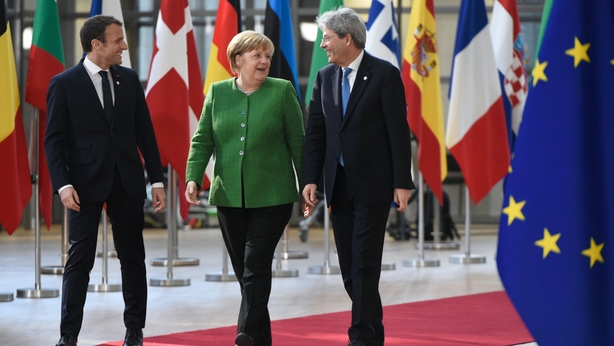European Council President Donald Tusk dismissed as "pure illusion" the ideas floated by Britain so far on what sort of relationship it would want with the European Union after it leaves the bloc.
Mr Tusk said European Union leaders would push ahead with the release of their own red lines for the negotiations at a summit in March, whether Britain is ready or not.
Mr Tusk was speaking after an informal meeting of EU leaders in Brussels today.
British Prime Minister Theresa May took senior ministers to her country retreat of Chequers yesterday to discuss what economic ties they want Britain to have with the EU after leaving the union in March 2019.
Mrs May is to deliver a long-awaited speech setting out her vision for Britain's future relationship with the European Union next Friday.
We need your consent to load this rte-player contentWe use rte-player to manage extra content that can set cookies on your device and collect data about your activity. Please review their details and accept them to load the content.Manage Preferences
"I am glad that the UK government seems to be moving towards a more detailed position," Mr Tusk said after the summit today.
"However ... I am afraid that the UK position today is based on pure illusion. It seems like the 'cake' philosophy is still alive," he said, referring to earlier comments by British officials that they wanted to "have their cake and eat it" when it came to leaving the EU's single market and enjoying its benefits.
"From the very start it has been a key clear principle of the EU 27 that there can be no cherry-picking and no single market 'a la carte'," said Mr Tusk.
Earlier today, European Commission President Jean-Claude Juncker said it would be "good for Britain" if he was prime minister.
Mr Juncker made the comment when asked about yesterday's British cabinet meeting.
"I am not the British prime minister, it would be good for Britain if I was it, but I am not," Mr Juncker told a reporter who quizzed him on when he expected to get details of the outcome.
"I am commenting on the outcome of the Chequers meeting when I know what is the exact conclusion," Mr Juncker added as he arrived at the summit, to which Britain was not invited.
Their comments capped a day of digs at the British side in the increasingly tense negotiations over Britain's planned departure from the European Union in March 2019.
The EU has repeatedly called on Britain to clarify as soon as possible what it wants in terms of future ties, so that negotiations can move ahead.
Mr Juncker, meanwhile, said he still assumed Britain would leave as planned in 2019, despite speculation about a repeat of the 2016 Brexit referendum.
"As far as the British parliament and government are concerned, it's for them to make any response to new questions which have arisen in the UK," Mr Juncker said.
"My working hypothesis is that Britain will leave at the end of March 2019."
Varadkar calls for legally binding guarantees on Brexit
Meanwhile, Taoiseach Leo Varadkar called for legally binding guarantees from Britain on Brexit.
Asked at the summit in Brussels whether he might be concerned that the agreements made in December might be downgraded in the final agreement, Mr Varadkar said: "The position of the Irish Government, which is the position of the European Union, is that we want the commitments and guarantees we were given in December written into the withdrawal agreement.
"It doesn’t really matter whether it’s in the body of the agreement or a protocol to the agreement, so long as it’s legally binding, we’ll be satisfied.
"But that’s not agreed yet, either by the European Commission or by the UK, but that’s what we’re working towards," he said.
Taoiseach calls for legally-binding guarantees from Britain on Brexit. pic.twitter.com/kfcqG09AfH
— RTÉ News (@rtenews) February 23, 2018
The leaders are said to be broadly agreed on a series of changes to EU institutions that arise from Britain's departure.
Among the measures discussed were plans to reallocate 27 of Britain’s 73 seats in the European Parliament to 14 smaller states after Brexit.
Leaders are reported to be broadly in favour of the plan and Ireland is likely to gain two extra MEPs.
They are also said to support each state keeping a member of the European Commission, something that they were required to review at this time.
In his intervention, the Taoiseach also supported keeping the same system for choosing the president of the European Commission, which means the leader of the political group with the most seats in the European Parliament would get the job.
A French proposal for a transnational constituency, using the remaining British MEP seat allocation, is unlikely to be ready in time for next year's election because it would require a lot of changes to electoral laws.

Leaders then moved on to discuss the EU budget, with Britain's departure set to leave a hole of about €10bn a year in the EU's budget.
The European Commission has warned of cuts to the Common Agricultural Policy if member states are not prepared to increase funding.
It has warned that without an increase in contributions from member states, there will have to be cuts to the biggest spending areas, the CAP and structural and regional funds.
It could also mean scaling back on new areas of EU activity, notably migration and border control, and defence.
